Fleurs du Mal Magazine



The Sorrows of Young Werther (49) by J.W. von Goethe
NOVEMBER 3.
Witness, Heaven, how often I lie down in my bed with a wish, and even a
hope, that I may never awaken again. And in the morning, when I open my
eyes, I behold the sun once more, and am wretched. If I were whimsical,
I might blame the weather, or an acquaintance, or some personal
disappointment, for my discontented mind; and then this insupportable
load of trouble would not rest entirely upon myself. But, alas! I feel
it too sadly. I am alone the cause of my own woe, am I not? Truly,
my own bosom contains the source of all my sorrow, as it previously
contained the source of all my pleasure. Am I not the same being who
once enjoyed an excess of happiness, who, at every step, saw paradise
open before him, and whose heart was ever expanded toward the whole
world? And this heart is now dead, no sentiment can revive it; my eyes
are dry; and my senses, no more refreshed by the influence of soft
tears, wither and consume my brain. I suffer much, for I have lost
the only charm of life: that active, sacred power which created worlds
around me,–it is no more. When I look from my window at the distant
hills, and behold the morning sun breaking through the mists, and
illuminating the country around, which is still wrapped in silence,
whilst the soft stream winds gently through the willows, which have shed
their leaves; when glorious nature displays all her beauties before me,
and her wondrous prospects are ineffectual to extract one tear of joy
from my withered heart, I feel that in such a moment I stand like a
reprobate before heaven, hardened, insensible, and unmoved. Oftentimes
do I then bend my knee to the earth, and implore God for the blessing
of tears, as the desponding labourer in some scorching climate prays for
the dews of heaven to moisten his parched corn.
But I feel that God does not grant sunshine or rain to our importunate
entreaties. And oh, those bygone days, whose memory now torments me!
why were they so fortunate? Because I then waited with patience for
the blessings of the Eternal, and received his gifts with the grateful
feelings of a thankful heart.
The Sorrows of Young Werther (Die Leiden des jungen Werther) by J.W. von Goethe. Translated by R.D. Boylan.
To be continued
fleursdumal.nl magazine
More in: -Die Leiden des jungen Werther, Goethe, Johann Wolfgang von
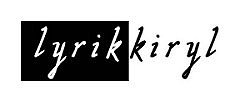
Geparkeerd op een vluchtstrook
Opgedragen aan Sjors Pijnenburg, Kristy van den Schoor, Astrid Hornikx
en alle andere slachtoffers van vlucht MH 17
die uit de lucht geschoten werd.
Geen weerzien meer nooit meer vakantie
brokstukken liggen in een ander deel
van de wereld de resten van het toestel
liggen bedekt onder valse vlaggen en
complottheorieën we huilen om jullie
slachtoffers van een andere oorlog
we hadden je nog graag we wilden nog
jullie leefden nog zoveel dingen die we nog
konden doen vielen uit de lucht vervlogen
aan ons is het afscheid nemen
aan ons is het herinneren zodat
de dood wat minder definitief lijkt
aan ons is dan het wijzen in
de richting van een schuldige
en zelfs als ie het niet gedaan heeft
krijgt ie nog de schuld het is moeilijk
met zoveel verlies om te gaan het
blijft vreemd hoe de dood iets is geworden
dat gevierd of gewroken moet
dat mensen geliefden kwijt zijn
en nooit zullen weten waarom
op tv rijdt een zwart lint lijkwagens
rijdt van Eindhoven naar Hilversum
en de rest van het verkeer staat net
als de rest van het land voor even
geparkeerd op een vluchtstrook
applaus voor de doden een klein
zinloos monument een vlucht uit
de werkelijkheid.
Martin Beversluis
fleursdumal.nl magazine
More in: Archive A-B, Beversluis, Martin
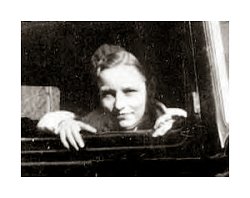
Bonnie Elizabeth Parker
(1910 – 1934)
The Street Girl
You don’t want to marry me honey,
Though just to hear you ask me is sweet;
If you did you’d regret it tomorrow
For I’m only a girl of the street.
Time was when I’d gladly have listened,
Before I was tainted with shame,
But it wouldn’t be fair to you honey;
Men laugh when they mention my name.
Back there on the farm in Nebraska,
I might have said yes to you then,
But I thought the world was a playground;
Just teeming with Santa Claus men.
So I left the old home for the city,
To play in its mad, dirty whirl,
Never knowing how little of pity,
It holds for a slip of a girl.
You think I’m still good-looking honey!
But no I am faded and spent,
Even Helen of Troy would look seedy,
If she followed the pace I went.
But that day I came in from the country,
With my hair down my back in a curl;
Through the length and the breadth of the city,
There was never a prettier girl.
I soon got a job in the chorus,
With nothing but looks and a form,
I had a new man every evening,
And my kisses were thrilling and warm.
I might have sold them for a fortune,
To some old sugar daddy with dough,
But youth called to youth for its lover,
There was plenty that I didn’t know.
Then I fell for the ‘line’ of a ‘junker’,
A slim devotee of hop,
And those dreams in the juice of a poppy;
Had got me before I could stop.
But I didn’t care while he loved me,
Just to lie in his arms was a delight,
But his ardour grew cold and he left me;
In a Chinatown ‘hop-joint’ one night.
Well I didn’t care then what happened,
A Chink took me under his wing,
And down there in a hovel of hell —
I laboured for Hop and Ah-Sing
Oh no I’m no longer a ‘Junker’,
The police came and got me one day,
And I took the one cure that is certain,
That island out there in the bay.
Don’t spring that old gag of reforming,
A girl hardly ever goes back,
Too many are eager and waiting;
To guide her feet off of the track.
A man can break every commandment
And the world will still lend him a hand,
Yet a girl that has loved, but un-wisely
Is an outcast all over the land.
You see how it is don’t you honey,
I’d marry you now if I could,
I’d go with you back to the country,
But I know it won’t do any good,
For I’m only a poor branded woman
And I can’t get away from the past.
Good-bye and God bless you for asking
But I’ll stick out now till the last.
Bonnie (from Bonnie & Clyde) Parker poetry
fleursdumal.nl magazine
More in: Archive O-P, Archive O-P, Bonnie and Clyde, Bonnie Parker, CRIME & PUNISHMENT
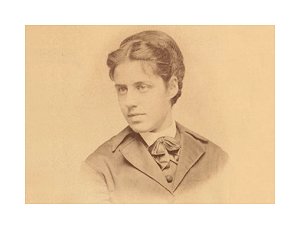
Emma Lazarus
(1849 – 1887)
Regret
Thin summer rain on grass and bush and hedge,
Reddening the road and deepening the green
On wide, blurred lawn, and in close-tangled sedge;
Veiling in gray the landscape stretched between
These low broad meadows and the pale hills seen
But dimly on the far horizon’s edge.
In these transparent-clouded, gentle skies,
Wherethrough the moist beams of the soft June sun
Might any moment break, no sorrow lies,
No note of grief in swollen brooks that run,
No hint of woe in this subdued, calm tone
Of all the prospect unto dreamy eyes.
Only a tender, unnamed half-regret
For the lost beauty of the gracious morn;
A yearning aspiration, fainter yet,
For brighter suns in joyous days unborn,
Now while brief showers ruffle grass and corn,
And all the earth lies shadowed, grave, and wet;
Space for the happy soul to pause again
From pure content of all unbroken bliss,
To dream the future void of grief and pain,
And muse upon the past, in reveries
More sweet for knowledge that the present is
Not all complete, with mist and clouds and rain.
Emma Lazarus poetry
fleursdumal.nl magazine
More in: Archive K-L, Lazarus, Emma
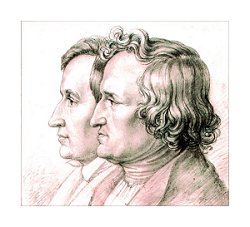 Jacob & Wilhelm Grimm ♦ Rumpelstiltskin ♦ There was once a miller who was poor, but he had one beautiful daughter. It happened one day that he came to speak with the king, and, to give himself consequence, he told him that he had a daughter who could spin gold out of straw. The king said to the miller, “That is an art that pleases me well; if thy daughter is as clever as you say, bring her to my castle to-morrow, that I may put her to the proof.”
Jacob & Wilhelm Grimm ♦ Rumpelstiltskin ♦ There was once a miller who was poor, but he had one beautiful daughter. It happened one day that he came to speak with the king, and, to give himself consequence, he told him that he had a daughter who could spin gold out of straw. The king said to the miller, “That is an art that pleases me well; if thy daughter is as clever as you say, bring her to my castle to-morrow, that I may put her to the proof.”
When the girl was brought to him, he led her into a room that was quite full of straw, and gave her a wheel and spindle, and said, “Now set to work, and if by the early morning thou hast not spun this straw to gold thou shalt die.” And he shut the door himself, and left her there alone. And so the poor miller’s daughter was left there sitting, and could not think what to do for her life: she had no notion how to set to work to spin gold from straw, and her distress grew so great that she began to weep. Then all at once the door opened, and in came a little man, who said, “Good evening, miller’s daughter; why are you crying?”
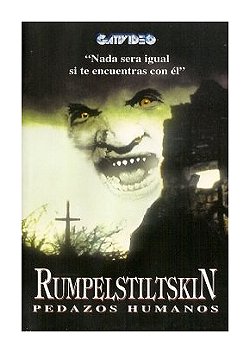 “Oh!” answered the girl, “I have got to spin gold out of straw, and I don’t understand the business.” Then the little man said, “What will you give me if I spin it for you?” – “My necklace,” said the girl. The little man took the necklace, seated himself before the wheel, and whirr, whirr, whirr! three times round and the bobbin was full; then he took up another, and whirr, whirr, whirr! three times round, and that was full; and so he went on till the morning, when all the straw had been spun, and all the bobbins were full of gold.
“Oh!” answered the girl, “I have got to spin gold out of straw, and I don’t understand the business.” Then the little man said, “What will you give me if I spin it for you?” – “My necklace,” said the girl. The little man took the necklace, seated himself before the wheel, and whirr, whirr, whirr! three times round and the bobbin was full; then he took up another, and whirr, whirr, whirr! three times round, and that was full; and so he went on till the morning, when all the straw had been spun, and all the bobbins were full of gold.
At sunrise came the king, and when he saw the gold he was astonished and very much rejoiced, for he was very avaricious. He had the miller’s daughter taken into another room filled with straw, much bigger than the last, and told her that as she valued her life she must spin it all in one night. The girl did not know what to do, so she began to cry, and then the door opened, and the little man appeared and said, “What will you give me if I spin all this straw into gold?” – “The ring from my finger,” answered the girl. So the little man took the ring, and began again to send the wheel whirring round, and by the next morning all the straw was spun into glistening gold. The king was rejoiced beyond measure at the sight, but as he could never have enough of gold, he had the miller’s daughter taken into a still larger room full of straw, and said, “This, too, must be spun in one night, and if you accomplish it you shall be my wife.” For he thought, “Although she is but a miller’s daughter, I am not likely to find any one richer in the whole world.” As soon as the girl was left alone, the little man appeared for the third time and said, “What will you give me if I spin the straw for you this time?” – “I have nothing left to give,” answered the girl. “Then you must promise me the first child you have after you are queen,” said the little man. “But who knows whether that will happen?” thought the girl; but as she did not know what else to do in her necessity, she promised the little man what he desired, upon which he began to spin, until all the straw was gold. And when in the morning the king came and found all done according to his wish, he caused the wedding to be held at once, and the miller’s pretty daughter became a queen.
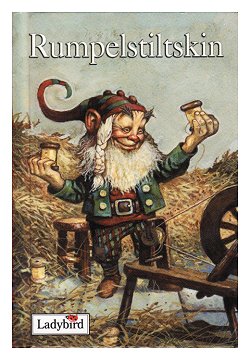 In a year’s time she brought a fine child into the world, and thought no more of the little man; but one day he came suddenly into her room, and said, “Now give me what you promised me.” The queen was terrified greatly, and offered the little man all the riches of the kingdom if he would only leave the child; but the little man said, “No, I would rather have something living than all the treasures of the world.” Then the queen began to lament and to weep, so that the little man had pity upon her. “I will give you three days,” said he, “and if at the end of that time you cannot tell my name, you must give up the child to me.”
In a year’s time she brought a fine child into the world, and thought no more of the little man; but one day he came suddenly into her room, and said, “Now give me what you promised me.” The queen was terrified greatly, and offered the little man all the riches of the kingdom if he would only leave the child; but the little man said, “No, I would rather have something living than all the treasures of the world.” Then the queen began to lament and to weep, so that the little man had pity upon her. “I will give you three days,” said he, “and if at the end of that time you cannot tell my name, you must give up the child to me.”
Then the queen spent the whole night in thinking over all the names that she had ever heard, and sent a messenger through the land to ask far and wide for all the names that could be found. And when the little man came next day, (beginning with Caspar, Melchior, Balthazar) she repeated all she knew, and went through the whole list, but after each the little man said, “That is not my name.” The second day the queen sent to inquire of all the neighbours what the servants were called, and told the little man all the most unusual and singular names, saying, “Perhaps you are called Roast-ribs, or Sheepshanks, or Spindleshanks?” But he answered nothing but “That is not my name.” The third day the messenger came back again, and said, “I have not been able to find one single new name; but as I passed through the woods I came to a high hill, and near it was a little house, and before the house burned a fire, and round the fire danced a comical little man, and he hopped on one leg and cried,
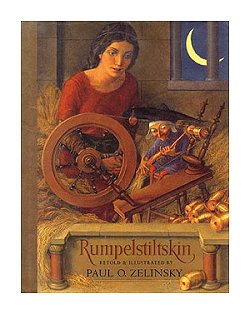 “To-day do I bake, to-morrow I brew,
“To-day do I bake, to-morrow I brew,
The day after that the queen’s child comes in;
And oh! I am glad that nobody knew
That the name I am called is Rumpelstiltskin!”
You cannot think how pleased the queen was to hear that name, and soon afterwards, when the little man walked in and said, “Now, Mrs Queen, what is my name?” she said at first, “Are you called Jack?” – “No,” answered he. “Are you called Harry?” she asked again. “No,” answered he. And then she said, “Then perhaps your name is Rumpelstiltskin?”
“The Devil told you that! the Devil told you that!” cried the little man, and in his anger he stamped with his right foot so hard that it went into the ground above his knee; then he seized his left foot with both his hands in such a fury that he split in two, and there was an end of him.
THE END
Jacob Grimm (1785-1863) & Wilhelm Grimm (1786-1859). This Brothers Grimm version of the story has been translated in 1844 into English by Margarate Hunt. KHM1 055: Kinder- und Hausmärchen (Children’s and Household Tales)
fleursdumal.nl magazine
More in: Grimm, Grimm, Jacob & Wilhelm
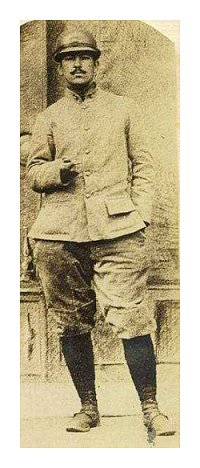
Alan Seeger
(1888-1916)
Do You Remember Once . . .
I
Do you remember once, in Paris of glad faces,
The night we wandered off under the third moon’s rays
And, leaving far behind bright streets and busy places,
Stood where the Seine flowed down between its quiet quais?
The city’s voice was hushed; the placid, lustrous waters
Mirrored the walls across where orange windows burned.
Out of the starry south provoking rumors brought us
Far promise of the spring already northward turned.
And breast drew near to breast, and round its soft desire
My arm uncertain stole and clung there unrepelled.
I thought that nevermore my heart would hover nigher
To the last flower of bliss that Nature’s garden held.
There, in your beauty’s sweet abandonment to pleasure,
The mute, half-open lips and tender, wondering eyes,
I saw embodied first smile back on me the treasure
Long sought across the seas and back of summer skies.
Dear face, when courted Death shall claim my limbs and find them
Laid in some desert place, alone or where the tides
Of war’s tumultuous waves on the wet sands behind them
Leave rifts of gasping life when their red flood subsides,
Out of the past’s remote delirious abysses
Shine forth once more as then you shone,–beloved head,
Laid back in ecstasy between our blinding kisses,
Transfigured with the bliss of being so coveted.
And my sick arms will part, and though hot fever sear it,
My mouth will curve again with the old, tender flame.
And darkness will come down, still finding in my spirit
The dream of your brief love, and on my lips your name.
II
You loved me on that moonlit night long since.
You were my queen and I the charming prince
Elected from a world of mortal men.
You loved me once. . . . What pity was it, then,
You loved not Love. . . . Deep in the emerald west,
Like a returning caravel caressed
By breezes that load all the ambient airs
With clinging fragrance of the bales it bears
From harbors where the caravans come down,
I see over the roof-tops of the town
The new moon back again, but shall not see
The joy that once it had in store for me,
Nor know again the voice upon the stair,
The little studio in the candle-glare,
And all that makes in word and touch and glance
The bliss of the first nights of a romance
When will to love and be beloved casts out
The want to question or the will to doubt.
You loved me once. . . . Under the western seas
The pale moon settles and the Pleiades.
The firelight sinks; outside the night-winds moan —
The hour advances, and I sleep alone.
III
Farewell, dear heart, enough of vain despairing!
If I have erred I plead but one excuse —
The jewel were a lesser joy in wearing
That cost a lesser agony to lose.
I had not bid for beautifuller hours
Had I not found the door so near unsealed,
Nor hoped, had you not filled my arms with flowers,
For that one flower that bloomed too far afield.
If I have wept, it was because, forsaken,
I felt perhaps more poignantly than some
The blank eternity from which we waken
And all the blank eternity to come.
And I betrayed how sweet a thing and tender
(In the regret with which my lip was curled)
Seemed in its tragic, momentary splendor
My transit through the beauty of the world.
Alan Seeger poetry
fleursdumal.nl magazine
More in: Archive S-T, Seeger, Alan, WAR & PEACE
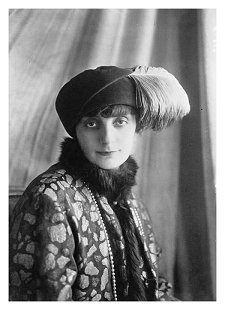
Anna de Noailles
(1876-1933)
Le coeur
Mon coeur tendu de lierre odorant et de treilles,
Vous êtes un jardin où les quatre saisons
Tenant du buis nouveau, des grappes de groseilles
Et des pommes de pin, dansent sur le gazon…
– Sous les poiriers noueux couverts de feuilles vives
Vous êtes le coteau qui regarde la mer,
Ivre d’ouïr chanter, quand le matin arrive,
La cigale collée au brin de menthe amer.
– Vous êtes un vallon escarpé ; la nature
Tapisse votre espace et votre profondeur
De mousse délicate et de fraîche verdure.
– Vous êtes dans votre humble et pastorale odeur
Le verger fleurissant et le gai pâturage
Où les joyeux troupeaux et les pigeons dolents
Broutent le chèvrefeuille ou lissent leur plumage.
– Et vous êtes aussi, coeur grave et violent,
La chaude, spacieuse et prudente demeure
Pleine de vins, de miel, de farine et de riz,
Ouverte au bon parfum des saisons et des heures,
Où la tendresse humaine habite et se nourrit…
Anna de Noailles poetry
fleursdumal.nl magazine
More in: Archive M-N, Noailles, Anna de

The Sorrows of Young Werther (48) by J.W. von Goethe
OCTOBER 27.
I could tear open my bosom with vexation to think how little we are capable of influencing the feelings of each other. No one can communicate to me those sensations of love, joy, rapture, and delight which I do not naturally possess; and, though my heart may glow with the most lively affection, I cannot make the happiness of one in whom the same warmth is not inherent.
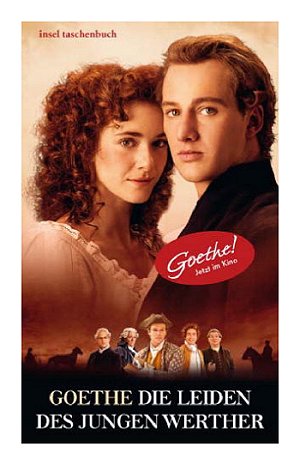
OCTOBER 27:
Evening: I possess so much, but my love for her absorbs it all. I possess so much, but without her I have nothing. OCTOBER 30. One hundred times have I been on the point of embracing her. Heavens! what a torment it is to see so much loveliness passing and repassing before us, and yet not dare to lay hold of it! And laying hold is the most natural of human instincts. Do not children touch everything they see? And I!
The Sorrows of Young Werther (Die Leiden des jungen Werther) by J.W. von Goethe. Translated by R.D. Boylan.
To be continued
fleursdumal.nl magazine
More in: -Die Leiden des jungen Werther, Goethe, Johann Wolfgang von
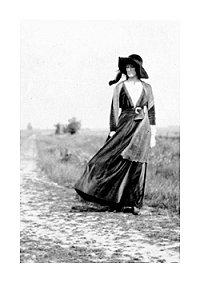
Elsa von Freytag-Loringhoven
(1874 – 1927)
ANCESTRY
ANCESTRY
DAD WAS CORKSCREW
BOTTLE FAIR MA —
CRIED SHE:
“GEE!
THY SPIRAL-LOFTY BRILLIANCY —
SLICK———”
“LET’S HAVE A CORKING TIME”
SNAPPED HE —
PULLED CORK ———
AND —DAMN HIS PRICK
I’VE GOT THAT TURN IN MEc .
E.V.F.L
Elsa von Freytag-Loringhoven poetry
fleursdumal.nl magazine
More in: Archive E-F, Dada, Freytag-Loringhoven, Elsa von
Guy de Maupassant
(1850-1893)
LÉGENDE DE LA CHAMBRE
DES DEMOISELLES À ÉTRETAT
Lentement le flot arrive
Sur la rive
Qu’il berce et flatte toujours.
C’est un triste chant d’automne
Monotone
Qui pleure après les beaux jours.
Sur la côte solitaire
Est une aire
Jetée au-dessus des eaux ;
Un étroit passage y mène,
Vrai domaine
Des mauves et des corbeaux.
C’est une grotte perdue,
Suspendue
Entre le ciel et les mers,
Une demeure ignorée
Séparée
Du reste de l’univers.
Jadis plus d’une gentille
Jeune fille
Y vint voir son amoureux ;
On dit que cette retraite
Si discrète
A caché bien des heureux.
On dit que le clair de lune
Vit plus d’une
Jouvencelle au coeur léger
Prendre le sentier rapide,
Intrépide
Insouciante au danger.
Mais comme un aigle tournoie
Sur sa proie,
Les guettait l’ange déchu,
Lui qui toujours laisse un crime
Où s’imprime
L’ongle de son pied fourchu.
Un soir près de la colline
Qui domine
Ce roc au front élancé,
Une fillette ingénue
Est venue
Attendant son fiancé.
Or celui qui perdit Eve,
Sur la grève
La suivit d’un pied joyeux ;
“Hymen, dit-il, vous invite,
“Venez vite,
“La belle fille aux doux yeux,
“Là-bas sur un lit de roses
“Tout écloses
“Vous attend le jeune Amour ;
“Pour accomplir ses mystères
“Solitaires
“Il a choisi cette tour.”
Elle était folle et légère,
L’étrangère,
Hélas, et n’entendit pas
Pleurer son ange fidèle,
Et près d’elle
Satan qui riait tout bas.
Car elle suivit son guide
Si perfide
Et par le sentier glissant.
Bat la rive
Mais lui, félon, de la cime,
Dans l’abîme
Il la jeta, – Dieu Puissant !
Son ombre pâle est restée
Tourmentée,
Veillant sur l’étroit chemin.
Sitôt que de cette roche
On approche
Elle étend sa blanche main.
Depuis qu’en ces lieux, maudite
Elle habite,
Aucun autre n’est tombé.
C’est ainsi qu’elle se venge
De l’archange
Auquel elle a succombé.
Allez la voir, Demoiselles,
Jouvencelles
Que mon récit attrista,
Car pour vous la renommée
L’a nommée
Cette grotte d’Étretat !
A son pied le flot arrive
Bat la rive
Qu’il berce et flatte toujours.
C’est un triste chant d’automne
Monotone
Qui pleure après les beaux jours.
Légende de la Chambre des Demoiselles à Étretat a paru dans le Mercure de France du 15 décembre 1922.
Guy de Maupassant poetry
fleursdumal.nl magazine
More in: Archive M-N, Guy de Maupassant, Maupassant, Guy de
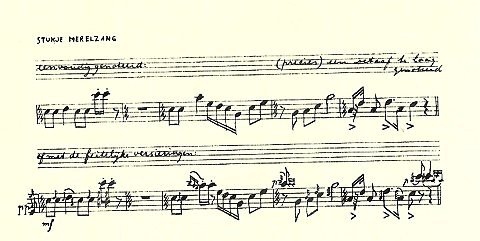
VARA Vroege Vogels
MERELZANG – JAN HANLO – TOM AMERICA
a.s. Zondag 13 juli, Radio 1
tussen 7 en 10 uur
In de bundel In een gewoon rijtuig (1966) PUBLICEERDE Jan Hanlo een kleine partituurtje (zie bijlage) getiteld STUKJE MERELZANG. Hij schreef eronder:
Dit fragmentje merelzang op een bandopname die ik gemaakt had, viel mij eerst heel niet op – het was een tamelijk zachte opname – maar na enige tijd begon het mij te interesseren. Deze muziek is nl. opvallend gelijk aan het menselijk idioom.
Jan Hanlo had minitieus de noten genoteerd die hem zo opvielen. Omdat waarschijnlijk nooit iemand dit minicompositietje eerder gehoord had, heeft Tom America in de slipstream van zijn cd ‘tjielp tjielp’ (1997) deze noten in zijn computer ingevoerd en er een klein arrangementje omheen gebouwd. Aanstaande zondag 13 juli zal het VARA programma Vroege Vogels de radio-wereld-première hebben van dit kleinood. Dit alles in het kader van de Nederlandse Kampioenschappen Merelzang.
fleursdumal.nl magazine
More in: Art & Literature News, Hanlo, Jan, MUSEUM OF NATURAL HISTORY - department of ravens & crows, birds of prey, riding a zebra, spring, summer, autumn, winter, Tom America
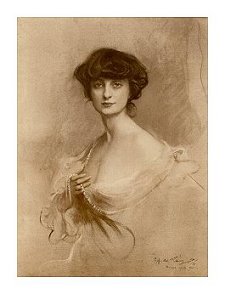
Anna de Noailles
(1876-1933)
Les parfums
Mon coeur est un palais plein de parfums flottants
Qui s’endorment parfois aux plis de ma mémoire,
Et le brusque réveil de leurs bouquets latents
– Sachets glissés au coin de la profonde armoire –
Soulève le linceul de mes plaisirs défunts
Et délie en pleurant leurs tristes bandelettes…
Puissance exquise, dieux évocateurs, parfums,
Laissez fumer vers moi vos riches cassolettes !
Parfum des fleurs d’avril, senteur des fenaisons,
Odeur du premier feu dans les chambres humides,
Arômes épandus dans les vieilles maisons
Et pâmés au velours des tentures rigides ;
Apaisante saveur qui s’échappe du four,
Parfum qui s’alanguit aux sombres reliures,
Souvenir effacé de notre jeune amour
Qui s’éveille et soupire au goût des chevelures ;
Fumet du vin qui pousse au blasphème brutal,
Douceur du grain d’encens qui fait qu’on s’humilie,
Arome jubilant de l’azur matinal,
Parfums exaspérés de la terre amollie ;
Souffle des mers chargés de varech et de sel,
Tiède enveloppement de la grange bondée,
Torpeur claustrale éparse aux pages du missel,
Acre ferment du sol qui fume après l’ondée ;
Odeur des bois à l’aube et des chauds espaliers,
Enivrante fraîcheur qui coule des lessives,
Baumes vivifiants aux parfums familiers,
Vapeur du thé qui chante en montant aux solives !
– J’ai dans mon coeur un parc où s’égarent mes maux
Des vases transparents où le lilas se fane,
Un scapulaire où dort le buis des saints rameaux,
Des flacons de poison et d’essence profane.
Des fruits trop tôt cueillis mûrissent lentement
En un coin retiré sur des nattes de paille,
Et l’arome subtil de leur avortement
Se dégage au travers d’une invisible entaille…
– Et mon fixe regard qui veille dans la nuit
Sait un caveau secret que la myrrhe parfume,
Où mon passé plaintif, pâlissant et réduit,
Est un amas de cendre encor chaude qui fume.
– Je vais buvant l’haleine et les fluidités
Des odorants frissons que le vent éparpille,
Et j’ai fait de mon coeur, aux pieds des voluptés,
Un vase d’Orient où brûle une pastille…
Anna de Noailles poetry
fleursdumal.nl magazine
More in: Archive M-N, Noailles, Anna de
Thank you for reading Fleurs du Mal - magazine for art & literature